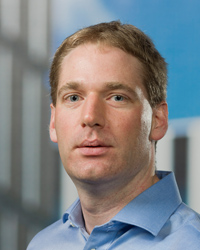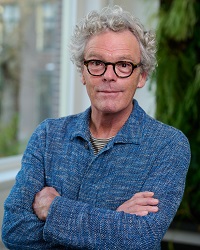
Programme directors meet again: ‘We are all working towards the same goal: good teaching’
They are responsible for a wide range of bachelor’s and master’s degree programmes but have more than enough in common to discuss: the programme directors and chairs. They met for the second time on 25 April to share knowledge and experiences and receive an update from Hester Bijl on strategic developments in higher education.

Given the developments on the internationalisation front, the uncertainty about whether a new cabinet will be formed and the tensions in the Middle East, we are in the midst of turbulent and unsettled times, said Hester Bijl at the opening of the meeting at the Leiden Education Fieldlab. ‘To meet these challenges, we need to strengthen connections and foster an open dialogue.’
In her presentation, Bijl gave an update on the Internationalisation in Balance bill, which aims to regulate the intake of international students to relieve the pressure on higher education. This is the subject of much discussion at Leiden University, she said, stressing how the international community is a crucial part of our academic community in Leiden and The Hague. Bijl also explained what the Israel-Palestine taskforce has been up to and mentioned the importance of starting a conversation in your own department. ‘It’s a difficult time but it also provides opportunities to learn from one another.’ She ended by sharing more information on the university’s Academia in Motion programme. Then, after a short break, it was time for the programme directors to get started with the university’s leadership model and to discuss how they can make effective use of the competencies in their own roles.
What did participants think of the event?

Marije Schneider, Programme Director of the Master of Laws
‘I realised once again this afternoon how useful it is to exchange experiences with directors from other faculties. And it’s nice to be updated at the strategic level by the Executive Board. With topics like these, it’s good to look beyond your backyard– and you get more insights and nuance here than if you were to come across the information elsewhere.
‘I found it fun yet tricky to set to work as a group with the different leadership competencies today. It’s difficult to decide which skills you find most useful because they all seem equally useful. Luckily we didn’t have to defend our choices. It was more about getting us thinking. What struck me during the session was that as programme directors we have rather a lot of tasks and responsibilities and yet little say. The question is how you can have an impact nonetheless. When it comes to good leadership, I feel that is still an interesting challenge.’

Martin Bright, Programme Director of the Bachelor’s in Mathematics
‘Although my own bachelor’s programme is taught in Dutch, I still found Hester Bijl’s presentation on internationalisation really useful. It’s currently part of the discussion wherever you go. So as directors, we need to know what is going on and what we can expect in the future.
‘I was already familiar with the leadership model and associated competencies but meetings like these do get you thinking about which of your skills you could brush up on. After all, the university should be a fun and friendly place to work and that won’t happen by itself. As a manager, you can play a positive part in that. I have taken leadership modules twice before and can definitely recommend them, also because you meet other managers and can compare experiences.’

Miranda van Eck, Programme Director for the Master’s in Bio-Pharmaceutical Sciences
‘I’ve been a programme director for 12 years now and find it really valuable to discuss common issues and challenges like this. I really appreciate Rector Magnificus Hester Bijl attending this personally. It shows that the Executive Board finds it important to be in direct contact with its programme directors. We are one university, after all, and we are all working towards the same goal: good teaching. It is a good illustration of the term “shared leadership”, which jumped out at me in the exercise on leadership competencies.
‘Today’s discussion was also about the university’s Academia in Motion programme (AiM). I’m really pleased with the AiM framework. It places teaching and research on an equal footing when it comes to recognition and rewards. What struck me in the discussions is that there is a feeling that much more needs to be done about the academic career pathways. We have been working nationwide with the same job profiles for a long time now but they aren’t much use in terms of rewarding teaching. I thought it was good that this was discussed here today. The job profiles must evolve along with Recognition and Rewards. I can’t wait to see what our Rector will do about this.’

Jan Sleutels, Director of the Honours College Humanities Lab
‘One of the reasons why I am here today is that I was curious whether there would be any news about internationalisation. I was not cheered by Hester Bijl’s explanation of the current situation and the position of international students. But we will have to wait and see what happens in the House of Representatives. At Humanities, at least, the topic is very much alive. Take our largest bachelor’s programme: International Studies. It’s an English-taught programme and the mix of Dutch and international students is really important. And that’s just one example. There is also a lot of worry and uncertainty among our non-Dutch-speaking staff. It was definitely good to discuss this with colleagues today.
‘It was an enjoyable and useful meeting anyway. It’s always nice to talk to colleagues from other faculties about what it’s like to be a programme director in medicine, say, or physics. I will definitely be there again next time, schedule permitting.’
About the meeting
The meeting for programme directors and chairs aims to give staff who coordinate and are responsible for some or all of a programme the opportunity to discuss strategic developments in the field of education, bring central policy closer to programmes and promote knowledge exchange. The meeting is held twice a year. There is a different theme each time.
Questions?
Do you have any questions about the meeting? Please contact the Strategy and Academic Affairs Directorate via Moena al Homsi.
